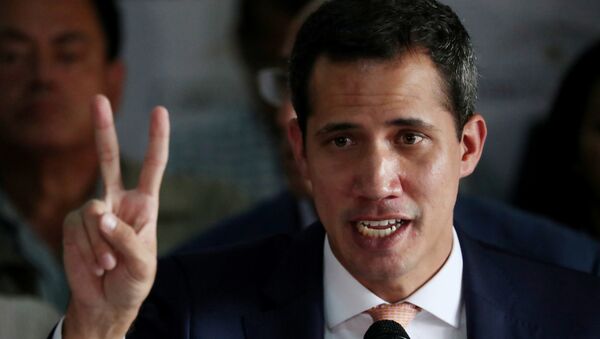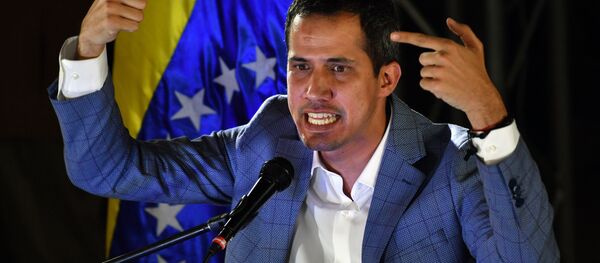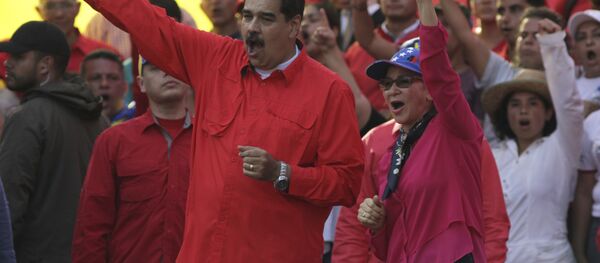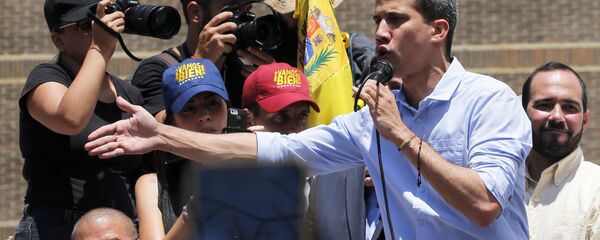Self-proclaimed interim president Juan Guaido said on Saturday that he asked his envoy to the United States to meet with Department of Defence officials to "cooperate" on a solution to the Venezuelan political crisis.
"We have instructed our ambassador Carlos Vecchio to meet immediately… with the Southern Command and its admiral to establish a direct relationship," Guaido said as cited by Reuters. "We have said from the beginning that we will use all the resources at our disposal to build pressure."
READ MORE: Pompeo Confirms Military Intervention in Venezuela Is Possible Option
Earlier, Guaido, while speaking to the Italian La Stampa newspaper, argued that a US military intervention in Venezuela is "one of the possibilities", claiming that after a failed coup attempt the country's opposition would have "more opportunities because more people are joining Operation Liberty." The latter is the campaign Guaido has started earlier this year in a bid to organise protesters and possibly sway the Armed Forces to his cause and eventually oust Maduro from the presidential palace in Caracas.
The Operation was started in March amid massive blackouts in Venezuela that officials said were the result of sabotage.
On 9 May, US Southern Command (USSOUTHCOM) combatant commander Admiral Craig Stephen Faller said on Twitter that he is looking "forward to discussing how we can support the future role" of Venezuelan armed forces leaders "who make the right decision" (an apparent hint at supporting Guaido) when invited by Guaido.
When invited by @jguaido & the legitimate gov't of #Venezuela, I look forward to discussing how we can support the future role of those @ArmadaFANB leaders who make the right decision, put the Venezuela people first & restore constitutional order. We stand ready! #EstamosUnidosVE pic.twitter.com/F6ib7mfO47
— U.S. Southern Command (@Southcom) May 9, 2019
Following Faller's statement, on 10 May, US ship USCGC James, which belongs to the United States Coast Guard, entered the Venezuelan waters but changed course after communicating with the Venezuelan Navy.
READ MORE: US Vessel Leaves Venezuelan Waters After Communicating With Country's Navy
Venezuela's Defence Minister Vladimir Padrino, reacting to the move, said Saturday that "we will not accept" these kinds of activities, according to Reuters.
On 5 May, US Secretary of State Mike Pompeo stated that Donald Trump "has his full range of Article 2 authorities" when asked if the US president believes he could intervene militarily in Venezuela without congressional approval. He highlighted that he believes that "any action" the US takes in Venezuela would be "lawful".
The statement appeared to be a reaffirmation of the previously expressed position that every single tool for what Pompeo described as US efforts "to restore democracy" in Venezuela remained on the table.
"We've made clear our goal is to convince Maduro it is time to leave. We're going to leave every option on the table to achieve that objective", he said.
Later one of the opposition lawmakers Edgar Zambrano was apprehended by intelligence agents and put in pretrial detention at a military prison in Caracas.
Another of Guaido's deputies Americo de Grazia entered the Italian embassy in Caracas on Thursday, while a third Guaido deputy who was also stripped of immunity — Luis Florido — says he has fled to Colombia.
READ MORE: Juan Guaido's Deputy Luis Florido Prosecuted For Failed Coup Flees to Colombia
Venezuelan President Nicolas Maduro reportedly signed a decree either reducing in rank or expelling dozens of officers, including high-ranking ones, from the country's armed forces over their involvement in the coup attempt.
The US, Canada, some Latin American and European nations were quick to recognize Guaido as the new legitimate leader of Venezuela and have supported him in his attempts to oust Maduro from power.
Russia, Bolivia, China, Cuba, Turkey and a number of other countries have voiced their support for constitutionally-elected Maduro as the only legitimate president of Venezuela.
Moscow accused the US of supporting coup attempts and planning a military intervention in the Latin American state.





